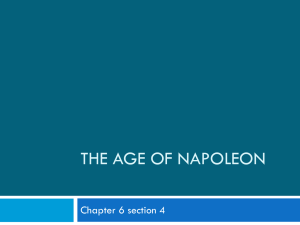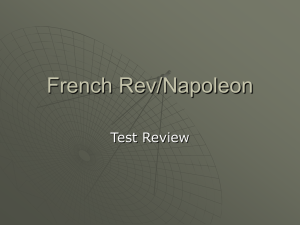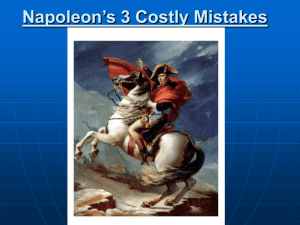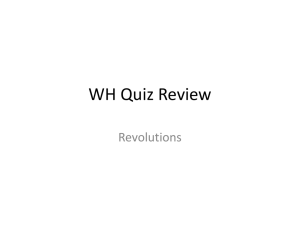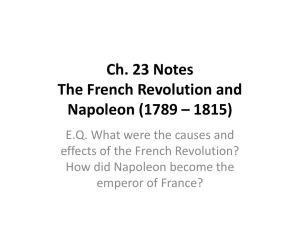File
advertisement
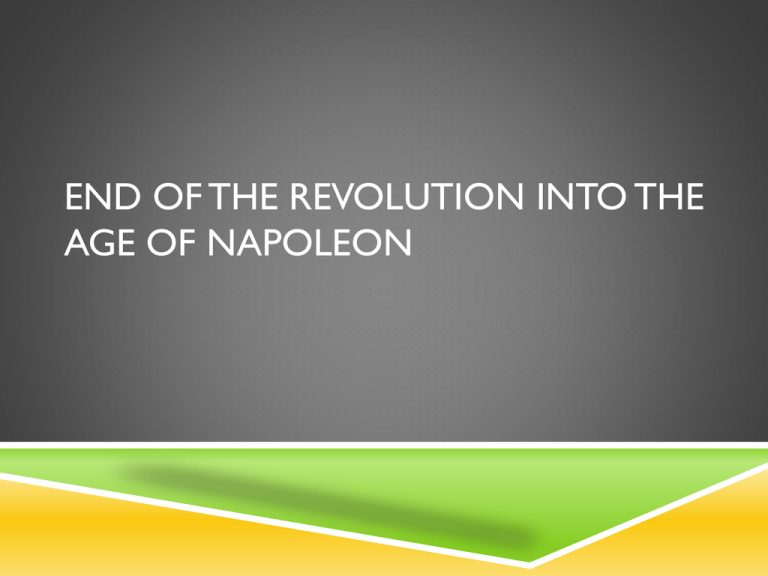
END OF THE REVOLUTION INTO THE AGE OF NAPOLEON End of the Terror Directory is created Napoleon overthro wDirecto ry Napoleon becomes Emperor • Robespierre is killed which leads to the end of the reign of terror • It is weak, corrupt and the people suffer • He is a general-military genius • A revolutionary • He is a dictator • France trades democracy for stability THE RISE OF NAPOLEON 1769 Born on island of Corsica 1793 Helps capture Toulon from British; promoted to brigadier general 1795 Crushes rebels opposed to the National Convention 1796–1797 Becomes commander in chief of the army of Italy; wins victories against Austria 1798–1799 Loses to the British in Egypt and Syria 1799 Overthrows Directory and becomes First Consul of France 1804 Crowns himself emperor of France A SELF-MADE EMPEROR- PRIMARY SOURCE FRANCE UNDER NAPOLEON- PROS AND CONS? Napoleon consolidated his power by strengthening the central government. Order, security, and efficiency replaced liberty, equality, and fraternity as the slogans of the new regime. Pros Cons • Napoleon instituted a number of reforms to restore economic prosperity • Napoleon developed a new law code, the Napoleonic Code, which embodied Enlightenment principles. • France was no longer a republic • Napoleon undid some of the reforms of the French Revolution: • Women lost most of their newly gained rights. BUILDING AN EMPIRE As Napoleon created a vast French empire, he redrew the map of Europe. He annexed, or added outright, some areas to France. He abolished the Holy Roman Empire. He cut Prussia in half. Napoleon controlled much of Europe through forceful diplomacy. He put friends and relatives on the thrones of Europe. He forced alliances on many European powers. Britain alone remained outside Napoleon’s empire. NAPOLEON’S POWER IN EUROPE BRAINSTORM! What other figures from history have a controversial reputation? Depending on who you ask or what part of their legacy you investigate they may be considered a…. HERO OR VILLIAN?!?? TWO VIEWS OF NAPOLEON Madame de Stael Marshal Michel Ney Half of the class will investigate Napoleon’s negative impact Half of the class will investigate Napoleon’s positive impact Use the worksheets and textbooks complete the organizor French empire- Conquered areas, also defended france Expanded Right-land to peasants, kept the declaration • Abolished serfdom • Stimulated industry • free trade Plebescite: voters have direct say on issue stability and food Napoleonic code Hero Louisiana purchase Built roads and canals Established bank of france Jobs based on merit not birth VILLAIN A dictator/emperor (for life) Proposed all laws, could dismiss officials, Self-named emperor, legendary Corruption-political leader Selfish-art and money from italy Cunning and forceful Overthrew directory Power hungry, glory Relatives on the throne Reversed some reforms 5 DOWNFALL OF NAPOLEON 1812—Napoleon’s forces were defeated in Russia. Russia, Britain, Austria, and Prussia form a new alliance against a weakened France. 1813—Napoleon was defeated in the Battle of Nations in Leipzig. 1814—Napoleon abdicated, or stepped down from power, and was exiled to Elba, an island in the Mediterranean Sea. 1815—Napoleon escaped his exile and returned to France. Combined British and Prussian forces defeated Napoleon at Waterloo. . Napoleon was forced to abdicate again, and was this time exiled to St. Helena, an island in the South Atlantic. 1821—Napoleon died in exile. 5 LEGACY OF NAPOLEON The Napoleonic Code consolidated many changes of the revolution. Napoleon turned France into a centralized state with a constitution. Elections were held with expanded, though limited, suffrage. Many more citizens had rights to property and access to education. French citizens lost many rights promised to them during the Convention. Led to the re-establishment of a French Monarchy On the world stage, Napoleon’s conquests spread the ideas of the revolution and nationalism. Napoleon failed to make Europe into a French empire. The abolition of the Holy Roman Empire would eventually contribute to the creation of a new Germany. Napoleon’s decision to sell France’s Louisiana Territory to America doubled the size of the United States and ushered in an age of American expansion. CONGRESS OF VIENNA The chief goal of the Congress was to create a lasting peace by establishing a balance of power and protecting the system of monarchy. To achieve this goal, the peacemakers did the following: They redrew the map of Europe. To contain French ambition, they ringed France with strong countries. They promoted the principle of legitimacy, restoring hereditary monarchies that the French Revolution or Napoleon had unseated. To protect the new order, Austria, Prussia, Russia, and Great Britain extended their wartime alliance into the postwar era. They achieved their immediate goals, but they failed to foresee how powerful new forces such as nationalism would shake the foundations of Europe EUROPE AFTER THE CONGRESS OF VIENNA, 1815 AFTER NAPOLEON… Congress of Vienna



